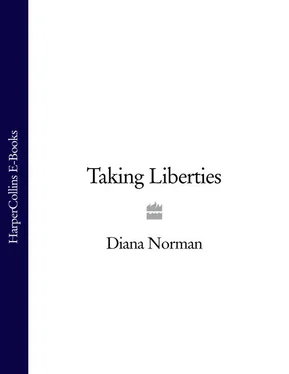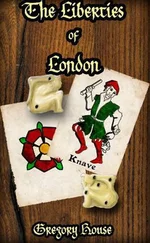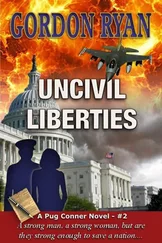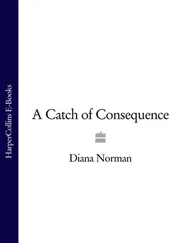And now to find, after years of expectation of freedom, that Diana, Countess of Stacpoole, had died with the husband she loathed. Beloved wife of …
I’m nothing without him. That was the irony. He’d defined her, not merely as his Countess, but as upholder of his honour, soother of the wounds he inflicted, underminer of his more terrible obsessions. He’d been her purpose, even if that purpose had been amelioration, sometimes sabotage, of his actions. Years of it. She had no other. Thirty-nine next birthday and she was now of no use to a living soul except to vacate the space she’d occupied.
She heard screams and in her exhaustion turned automatically to go back to the sickroom but, of course, they were Alice’s. In view of the news from France, Robert, like a good courtier, should return to his place by the King immediately and Alice was lamenting as if her husband were off to battle rather than a palace.
‘ Maman, Maman , come tell him he mustn’t leave or I shall go distraite .’
Yes, well. Alice liked an audience for her hysterics. Was being an audience a purpose? No, merely a function. She left the room to perform it.
To humour his wife, Robert said he would not go until tomorrow; the King would understand he had just buried his father.
Even so, Alice did not see fit to recover until late evening; the advent of France into the war causing her to see danger everywhere. ‘You must ask the King to give you guards. John Paul Jones will try and capture you, like he did the Earl of Selkirk.’
Alice, thought the Dowager, must be the only young woman who had not found that most recent raid by an American privateer a tiny bit thrilling. The papers had made much of it in apparent horror but the ghost of Robin Hood had been called up and, as always with the English weakness for daring, Mr Paul Jones’s brigandage was taking on a hue of romance.
Robert said: ‘My dear, the raid was a failure.’
Alice refused comfort. John Paul Jones, a Scotsman who’d joined the American side, was scouring his native coast to take an earl hostage. Robert was an earl. Ergo , John Paul Jones was out to capture Robert. ‘True, the Earl was absent on this occasion but his Countess was menaced . He took her silver service.’
‘I heard he returned it,’ the Dowager joined in. ‘In any case, we may comfort ourselves that Robert will be in London and not in a Scottish castle exposed to the sea. Mr Jones is hardly likely to sail up the Thames to get him.’
Alice was not so sure; she was enjoying her horrors. It wasn’t until late evening that she remembered the letter and handed it to her mother-in-law.
‘You will forgive me for overlooking it, Mama. It carried my title of course … so peculiar, sent on from Paris, not that I read it … the impudence , I wondered to show it to you at all but Robert said … who is Martha Grayle?’
Martha.
Salt and sun on her face, bare feet, a shrimping net, terracottacoloured cliffs against blue sky …
Careful not to show haste, the Dowager turned to the last page to see the signature and was caught by the final, disjointed paragraph. ‘… you are my long hope, dear soul … I am in great fear … as you too have a son … Your respectful servant, Martha Grayle (née Pardoe).’
She looked up to find Alice and Robert watching her.
Deliberately, she yawned. ‘I shall retire, I think. Goodnight, my dears.’
‘But will you not read the letter?’ Alice could hardly bear it.
‘In bed perhaps.’ Alice had waited to give it to her, she could now wait for a reaction to it. The whirligig of time brought in its petty revenges.
Joan was nodding in a bedroom chair, waiting to undress her, but when the areas that couldn’t be reached by the wearer had been unbuttoned and unhooked, Diana told her to go to bed. ‘I will do the rest myself.’
‘Very well, my dear.’
‘Joan, do you remember Martha Pardoe?’
‘Torbay.’ The old woman’s voice was fond.
‘Yes.’
‘Married that Yankee and went off to Americy.’
‘Yes.’
‘Happy days they was.’
She couldn’t wait for reminiscence. ‘Goodnight.’
With her mourning robes draped around her shoulders, the Dowager picked up the letter that had circumvented the cessation of mail between rebel and mother countries. Somewhere on its long journey from Virginia to France to London to Bedfordshire it had received a slap of salt water so that the bottom left-hand quarter of each page was indecipherable.
Martha had penned a superscription on its exterior page, presumably with a covering letter, for the unknown person in Paris who’d been charged with sending it on to England: ‘To be forwarded to the Countess of Stacpoole in England. Haste. Haste.’ Martha had been lucky; from this moment on there would be an embargo on general mail from France, just as from America; the letter had beaten the declaration of war by a short head.
The fact that Martha had written only on one side of each of her two pages indicated that, however personally distressed, she was in easy circumstances; paper of quality such as this was expensive.
She’d begun formally enough:
Respectful greetings to Your Ladyship, if I am so Fortunate that your eyes should see this letter. Of your Gracious Kindness forgive this Plea from an old acquaintance who would make so Bold as to remind Your Ladyship of glad Times in Torbay when you and she were Children undivided by sea or War. Pray God may resolve the Conflict between our Countries. I shall not Weary you with Remembrance, loving though it is to me, but Proceed to the case of my son, Forrest Grayle, who is but eighteen years old …
Here the water stain obscured the beginnings of several lines and Martha’s writing, which had begun neatly, began to sprawl as agitation seized her so that making sense of it caused the Dowager’s brow to wrinkle. She got up from the dressing-table stool and went to the lamp on the Louis Quinze table to turn up the wick, unconscious that she was doing so. ‘… such a desire that all may have Liberty as has caused Concern to his … nothing would satisfy but that he Volunteer for our navy … John Paul Jones in France to take possession of a new vessel built there …’
Now the relief of a new page, though the penmanship was worse and punctuation virtually non-existent.
O Diana word has it the Sam Adams is Captured and its Men taken to England and imprisoned for rebels while I say Nothing of this for it is War yet there are tales of what is done to men captured by King George’s army here in the South as would break the Heart of any Woman, be she English or American …
Here, again, the interruption of the water stain.
whether my husband would have me write, but he is dead these … I beseech you, in the name of Happier days, as you are a Mother and a … will know him if you remember my Brother whom you met that once at … the Likeness is so Exact that it doth bring Tears every time I … you can do if you can do any Thing for my boy in the name of Our …
Here the writing became enormous: ‘For you are my long hope, dear soul … I am in great fear … as you too have a son … for our old friendship …’ Slowly, the Dowager smoothed the letter flat and put it between the leaves of the bible lying on the table.
Yes, well.
She could do nothing, of course. Would do nothing. As her daughter-in-law said, the letter was an impertinence. Martha had expressed no regret for her adopted country’s rebellion; indeed, supposing her own interpretation to be correct, the woman had actually referred to the American fleet as ‘our navy’.
If the boy Forrest – what like of name was that? – is so enthusiastic to get rid of his rightful King, let him enthuse in prison as he deserves.
Читать дальше












